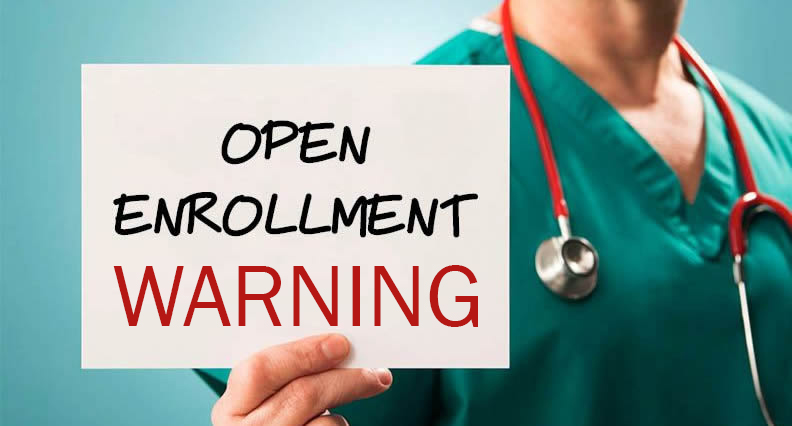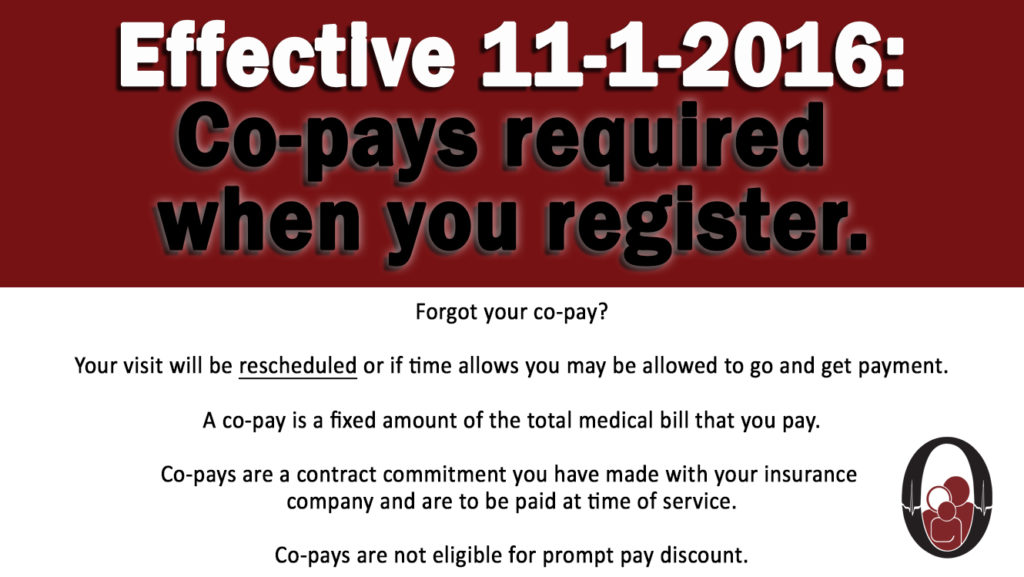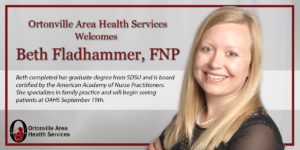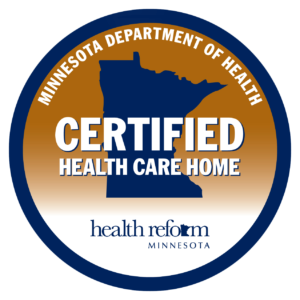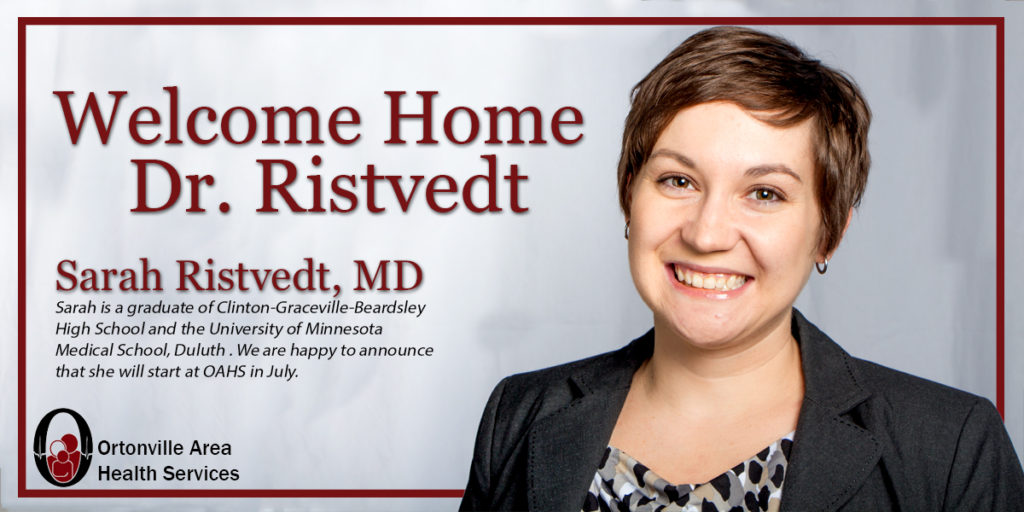OAHS Cardiac Rehab Coordinator, Kelly Kallhoff, RN, recently began to develop a new education program to better educate our patients on how the heart works, various cardiac procedures, the purpose of Cardiac Rehab, and other ways to be heart healthy. In her research, she discovered some video resources that touched on all of those topics and were perfect for the program. Unfortunately, due to space limitations, she just didn’t have a convenient way to get those resources into the hands of her patients. Dan Kafka was just beginning the Cardiac Rehab Program when this was beginning to develop. “Dan and I were chatting about the education portion,” said Kalhoff “and I stated that we are looking into getting an iPad but until then I was using my computer on wheels to view the videos.” Dan ran into OAHS CEO Dave Rogers and expressed that he would like to donate an iPad to the Cardiac Rehab Department for the education program. Kalhoff stated, “Thanks to Dan’s generosity, now my patients can watch and listen to important information about leading a heart-healthy lifestyle all while exercising and strengthening their hearts.” 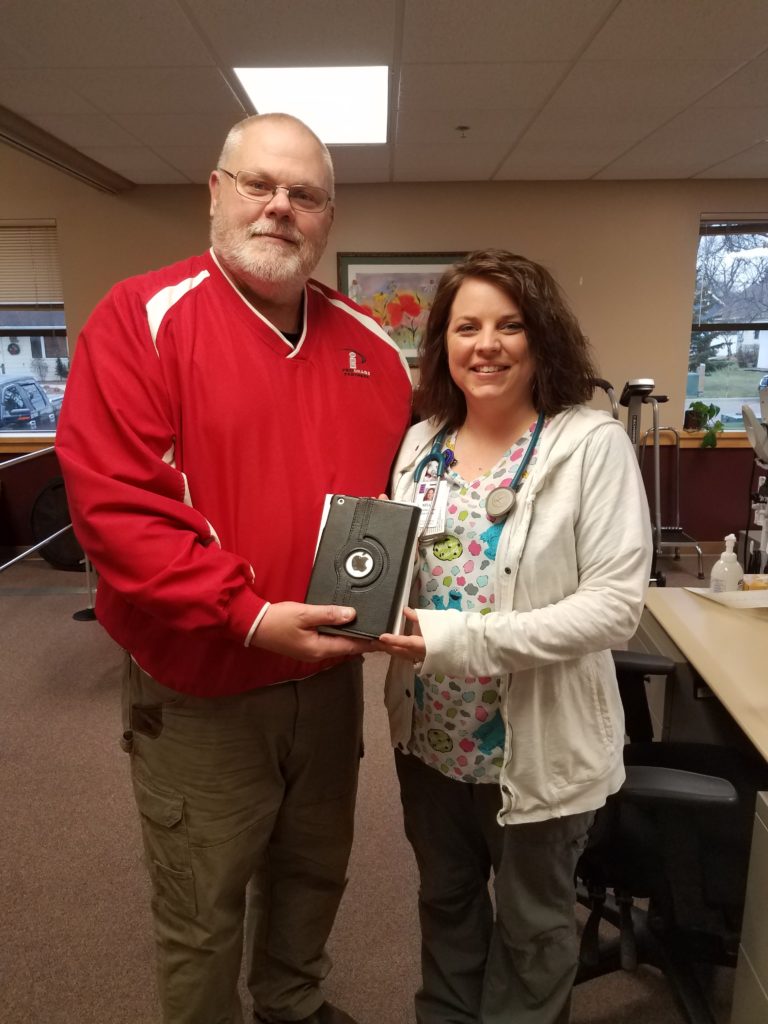
Kafka Donation Helps Improve Cardiac Rehab Education
10 Ways To Avoid Holiday Meltdowns
 When stress is at its peak, it’s hard to stop and regroup. Try to prevent stress and depression in the first place, especially if the holidays have taken an emotional toll on you in the past.
When stress is at its peak, it’s hard to stop and regroup. Try to prevent stress and depression in the first place, especially if the holidays have taken an emotional toll on you in the past.
- Acknowledge your feelings
If someone close to you has recently died or you can’t be with loved ones, realize that it’s normal to feel sadness and grief. It’s OK to take time to cry or express your feelings. You can’t force yourself to be happy just because it’s the holiday season. - Reach out
If you feel lonely or isolated, seek out community, religious, or other social events. They can offer support and companionship. Volunteering your time to help others also is a good way to lift your spirits and broaden your friendships. - Be realistic
The holidays don’t have to be perfect or just like last year. As families change and grow, traditions and rituals often change as well. Choose a few to hold on to, and be open to creating new ones. For example, if your adult children can’t come to your house, find new ways to celebrate together, such as sharing pictures, emails or videos. - Set aside differences
Try to accept family members and friends as they are, even if they don’t live up to all of your expectations. Set aside grievances until a more appropriate time for discussion. And be understanding if others get upset or distressed when something goes awry. Chances are they’re feeling the effects of holiday stress and depression, too. - Stick to a budget
Before you go gift and food shopping, decide how much money you can afford to spend. Then stick to your budget. Don’t try to buy happiness with an avalanche of gifts.
Try these alternatives:
- Donate to a charity in someone’s name
- Give homemade gifts
- Start a family gift exchange
- Plan ahead
Set aside specific days for shopping, baking, visiting friends and other activities. Plan your menus and then make your shopping list. That’ll help prevent last-minute scrambling to buy forgotten ingredients. And make sure to line up help for party prep and cleanup. - Learn to say no
Saying yes when you should say no can leave you feeling resentful and overwhelmed. Friends and colleagues will understand if you can’t participate in every project or activity. If it’s not possible to say no when your boss asks you to work overtime, try to remove something else from your agenda to make up for the lost time. - Don’t abandon healthy habits
Don’t let the holidays become a free-for-all. Overindulgence only adds to your stress and guilt.
Try these suggestions:
- Have a healthy snack before holiday parties so that you don’t go overboard on sweets, cheese or drinks.
- Get plenty of sleep.
- Incorporate regular physical activity into each day.
- Take a breather
Make some time for yourself. Spending just 15 minutes alone, without distractions, may refresh you enough to handle everything you need to do. Find something that reduces stress by clearing your mind, slowing your breathing and restoring inner calm.
Some options may include:
- Taking a walk at night and stargazing
- Listening to soothing music
- Getting a massage
- Reading a book.
- Seek professional help if you need it
Despite your best efforts, you may find yourself feeling persistently sad or anxious, plagued by physical complaints, unable to sleep, irritable and hopeless, and unable to face routine chores. If these feelings last for a while, talk to your doctor or a mental health professional.
Open Enrollment
Sanford Health Network Scholarship Winner
Congratulations to Chloe Campbell of Wilmot, SD. Chloe was recently chosen as the winner of a $2000 Sanford Health Network Scholarship. Chloe is enrolled in practical nursing at Lake Area Technical Institute in Watertown, SD, and has goals to be full time as an RN in a rural hospital or an OB nurse. “In this career path, I understand that I will have daily challenges, but yet the reward of being prepared to care for people in their time of need will be worthwhile,” said Cambell.
Pictured presenting Chloe her scholarship is Natasha Hynnek, one of our own clinic nurses. Recently Chloe was working as a student in our clinic when Natasha received an email announcing the opportunity for a Sanford Health Network Scholarship. Natasha encouraged Chloe to apply and, sure enough, she was chosen as the winner.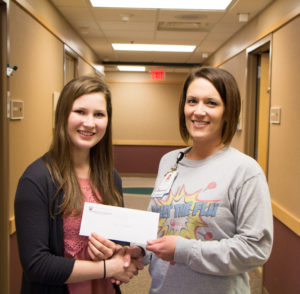
2016 Stork Review
We are thrilled to make the Stork Review available digitally for the first time.
Please click the link below to view the 2016 Stork Review!
2016 OAHS Christmas Baby
Introducing Ellecyn Ann, the 2016 OAHS Christmas Baby.
Ellecyn Ann was born December 27th at 8:24 am to Ryan and Jodi of Appleton, MN. She was 20 inches long, weighed 7lbs 15oz, and was delivered by Dr. Stacy Longnecker. Pictured here with mom, dad and her big sisters, Harper and Ainsley. Congratulations!
Dr. Ristvedt Update
The Ristvedts are proud to announce the arrival of Warren Dennis! Born 7/14/16, 11:22am at OAHS, weighing in at 3lbs 1oz.
Here is an update from Dr. Sarah Ristvedt:
Warren and I are still at Sanford in Sioux Falls, but doing well. Now 5lbs 5 oz, he just needs to get a little better at eating by mouth and get rid of the tube in his nose. Maverick(3.5 years) is a proud big brother, but misses his mom and is disappointed that he didn’t get to ride in the helicopter with his baby brother. We will hopefully all be back to our home in Graceville soon, and I plan to start full time at OAHS in November.
I was really looking forward to getting to start practice prior to maternity leave, however my son had other plans and was born 2 months early. While it was not anyone’s first choice for him to be born in Ortonville so early, have now experienced first hand the amazing skills and fast response of my future co workers! I’m also thankful for the wonderful NICU flight team at Sanford.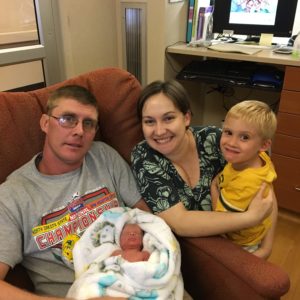
Health Care Home
What is a health care Home?
A health care home or patient centered medical home is an enhanced way of delivering health care. It is an advanced team approach to focus on you as a whole patient not just one aspect. This team approach can be very helpful for people with difficult and challenging health needs. This team approach of care delivery helps patients coordinate services they receive from specialists, therapists, and other services to better manage their health. Health care home teams will help to coordinate all aspects of care.
Team approach:
The health care home team includes you, your provider, a health coach, as well as other health care professionals and staff at our clinic. Your team will also include trusted family and/or friends who you have chosen to play a role in your health care. Your health coach will help you develop a care plan that addresses your needs and will coordinate your care with any specialists you may see.
Is Health Care home right for me?
You could benefit if you have:
• Chronic and/ or multiple illness
• Unstable or newly diagnosed illnesses
• Multiple medication
• Special health needs
What are the benefits?
- Your health care team or individual health coach will help you find specialty care or community services when needed and will make updates to your care plan with you.
- You and your primary care provider discuss your treatment options together and coordinate care with other specialists who care for you.
- You receive improved ability to communicate and make appointments with your health care team.
- You take charge of your health by assuming responsibility for aspects of your care.
- You will develop a relationship of mutual respect & trust with all team members as a platform for success.
- Your cultural and religious beliefs are valued. When possible, your preferences for treatment and care are met.
- You are given information to help you learn more about your ongoing health concerns and address issues sooner, resulting in less ER visits and hospital stays.
- Your primary care provider makes sure you understand your treatment choices.
How Can i get the best care?
- Become more involved with your health care:
- Bring a list of your top questions or concerns to discuss at every visit
- If you have a chronic condition, ask that your care plan is communicated with other medical providers, nurses or other people involved in your health care.
- Be open and honest about your health habits. Your primary care provider is here to help you, not judge you.
- Ask for something to be repeated if you do not understand it.
- Ask your primary care provider to write down the next steps.
- Ask how to get care after clinic hours
- Ask to meet the staff that will be working with you.
- Let your health care home team know how you are doing.
